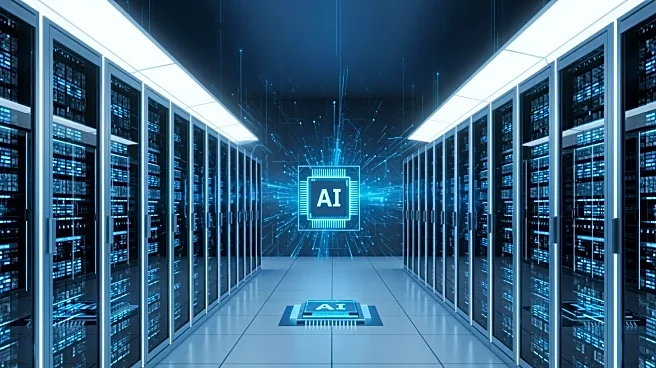What's Happening?
In the past year, major tech companies including Microsoft, Google, Amazon, and Meta have collectively invested approximately $360 billion in AI-related projects, primarily focusing on the construction
of data centers and the acquisition of computer chips and equipment. This spending is part of a broader trend where these companies are leveraging their substantial financial resources to advance AI technologies. The scale of investment is so significant that it surpasses the annual revenue of Texas from all sources, including state taxes and federal income. Additionally, the combined worth of these AI-centric companies, estimated at $23 trillion, exceeds the value of the next 96 most valuable U.S. companies combined.
Why It's Important?
The massive investment in AI by these tech giants highlights the growing importance and influence of artificial intelligence in the global economy. As AI technologies continue to evolve, they are expected to drive significant advancements across various sectors, including healthcare, finance, and transportation. However, the concentration of AI development within a few powerful companies raises concerns about market dominance and the potential for monopolistic practices. Furthermore, the environmental impact of constructing and operating large-scale data centers, which consume substantial amounts of electricity, poses challenges for sustainability efforts.
What's Next?
As AI technologies become more integrated into everyday life, regulatory bodies may need to address issues related to data privacy, ethical use, and the environmental impact of AI infrastructure. Additionally, the ongoing government shutdown has placed SNAP benefits in limbo, highlighting the disparity between tech investments and social welfare funding. Stakeholders, including policymakers and civil society groups, may push for more balanced resource allocation to ensure that technological advancements benefit a broader segment of society.
Beyond the Headlines
The rapid development and deployment of AI technologies could lead to significant shifts in the labor market, with automation potentially displacing certain jobs while creating new opportunities in tech-related fields. Ethical considerations surrounding AI, such as bias in algorithms and decision-making transparency, will likely become more prominent as these technologies are adopted more widely. Long-term, the focus on AI could drive innovation in other areas, such as quantum computing and advanced robotics.










